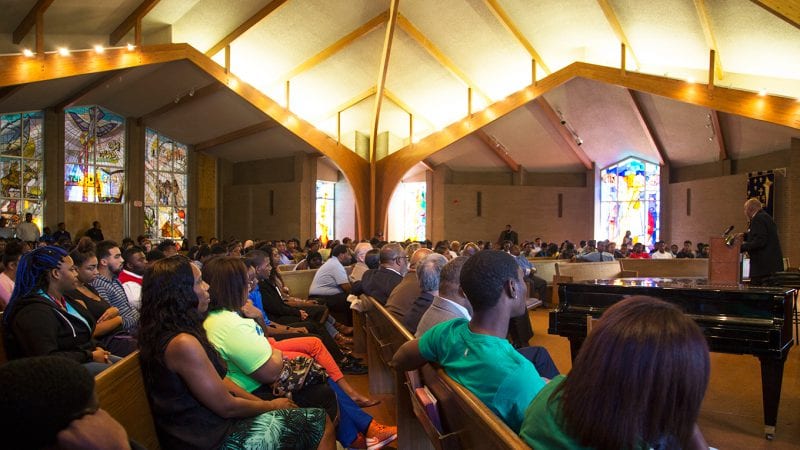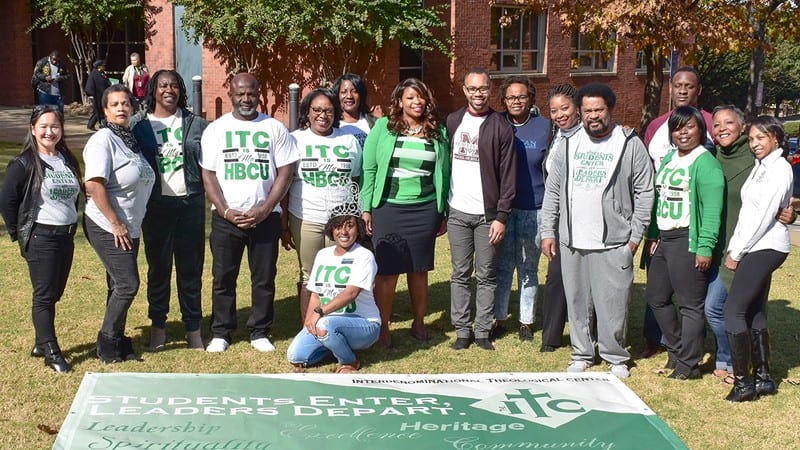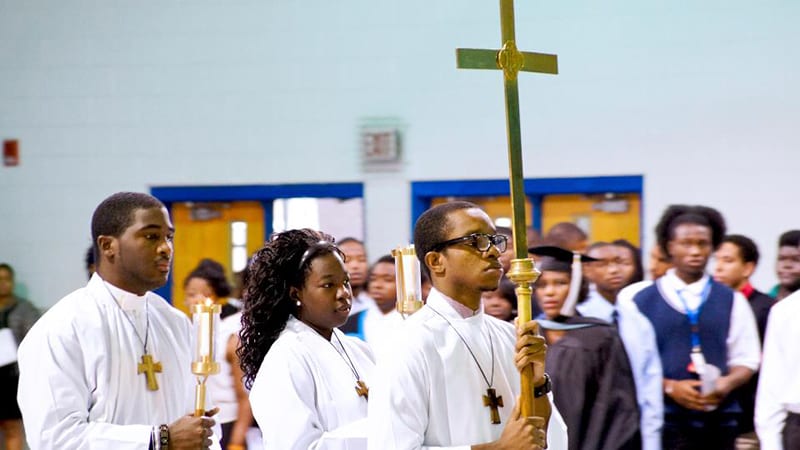Empowering Voices, Uplifting Communities: The Transformative Power of Black Ministry Majors in HBCUs

A ministry major is ideal for anyone who feels passionately about living a life dedicated to service in the name of God. As a ministry studies major, you’ll not only feel the joy that comes from living your faith and nurturing it in others, but will also have the rare satisfaction of experiencing your professional and spiritual lives overlap.
Contrary to what some people might think, an education in ministry studies isn’t purely philosophical in nature. While it’s true that a ministry studies degree will involve a lot of theology (that is, the study of religious beliefs, practices, and the nature of God), your studies will also be grounded in the practical application of these concepts, including religious leadership and communication. It’s also not unusual for some ministry studies programs to offer (or even require) fieldwork, such as internships or mission trips.
A ministry studies major will not only strengthen your commitment to your faith, but also equip you with the tools and techniques you need to teach the word of God and serve others through your career, whether that’s in the church or outside of it. Ultimately, the purpose of studying ministry in an academic context is to prepare you to become a steward of the Christian faith in your community and the larger world.
Why America Needs More Black Ministry Majors and Professionals
Although it has never been a universal or homogenous institution, Black churches have long been a cornerstone of African American communities and other communities of color. They have served not only as a spiritual sanctuary, but as a vibrant center for cultural, social, educational, and political life.
In an era when all of these are under serious threat for these communities, the need for more Black ministry majors and professionals becomes increasingly critical. These individuals are not simply purveyors of Christianity, but powerful actors in the broader narrative of human identity, autonomy, and justice.
Anchoring Communities and Cultures
Black churches are important pillars for the diverse cultural traditions, art forms, and identities of African American communities — both social and geographical — and have been since the era of slavery. They have offered a place of refuge, encouragement, and empowerment throughout American history, and have been a vital force through the civil rights movement, the Black Lives Matter movement, and beyond. These places of worship have been instrumental in fostering a sense of belonging and resilience in complex and fluid ways over time.
Supporting Equity, Advocating for Equality
The role of Black churches in advocating for racial equality cannot be overstated. The Pew Research Center’s findings indicate that about three quarters of Black Americans — religious and otherwise — recognize the Black church’s contributions to racial justice efforts. Through educational and training programs, community services, and advocacy, these churches have historically been at the forefront of the fight for civil rights, and they continue to acknowledge and address systemic inequalities today.
As just one example, during the civil rights movement, Black churches were pivotal in organizing and leading nonviolent protests and voter registration drives. The nurturing of Black ministry majors who deeply understand and value this legacy is crucial for continuing this tradition of community support and activism.
Protecting Black Church Autonomy
The identity and autonomy of Black churches is increasingly threatened by external forces seeking to co-opt these institutions — including both conservative and progressive white groups — for their own agendas, whether those are political, social, or theological. This has raised concerns about preserving the authentic voice and identity of the Black church.
An example of this tension is observed in how Black churches navigate their relationships with predominantly white denominations or political groups, which may not fully understand or respect Black church roots in African American culture and human rights struggles. Fostering a new generation of Black ministry majors will help to ensure that these sacred spaces continue to be by, about, and for the needs of Black Christians.
Expanding the Reach of a Culturally Responsive Ministry
Black churches are uniquely positioned to offer culturally responsive ministry, ensuring that the message of God’s love is conveyed in ways that resonate with communities of color. This means reaching members of those communities where they are, which is not just in church, but on college campuses and elsewhere.
The work of Black ministry students and professionals in crafting services, programs, and outreach efforts that reflect the lived experiences of their communities is vital. This approach is not merely about language, music, or denomination-related practices, but extends to understanding and addressing the social and emotional needs of the congregation within a culturally relevant framework.
Careers in Ministry
There’s a common misconception that a ministry studies degree is only useful to people who intend to attend seminary school and eventually become a pastor or clergy member. While it’s true that a ministry studies major provides excellent preparation for either of those pursuits, there are also a lot of other options available to individuals with a bachelor’s degree in ministry studies. Below are some of the careers that you might consider:
- Church administration
- Clergy
- Missionary
- Youth director
- Chaplain
- Teacher
- Christian organization/nonprofit professional
- Counselor or mentor
- Ministry support professional
- Program or camp administrator and/or developer
- Residence or program director at a Christian college or school
Whatever your interest, students who plan to pursue careers in ministry will need to enroll in a related degree program. These may offer different concentrations, and course subjects may include:
- Introduction to Christian ministry
- Christian theology
- Biblical history and interpretation
- The medieval church
- Christian ethics
- Evangelism
- Pastoral care and counseling
- Sermon preparation
HBCUs Can Help You Start a Career in a Ministry Discipline
Given the recent Supreme Court ruling on affirmative action in college admissions, more Black students are likely to turn to historically Black colleges and universities (HBCUs) for their education. In response, these institutions will do everything they can to meet increased student demand. HBCUs help more students earn college degrees, compete successfully for well-paying jobs in competitive career fields, improve workforce diversity, and increase upward economic mobility.
People of all ages, races, and life paths can help to improve diversity in ministry disciplines by supporting scholarships and other forms of funding for HBCUs with related programs. You can make a difference in the lives of ministry students in one easy step by making a donation today.
Want to learn more about ministry studies as a possible major or career path? Have questions about which UNCF colleges and universities offer this program? Looking for help with financing this degree?
Click Here So We Can Help You!

How to Prepare for Success
Arguably the best preparation for a ministry studies degree is a well-rounded spiritual practice, a familiarity with the Bible, and an understanding of religious communities. Participating actively in church or youth groups, Bible study, and religious services will all help with this.
However, a career in ministry or an adjacent profession will also require strong communication skills, both written and verbal. Moreover, whichever career you choose, you will likely be working with other people on a regular, if not constant, basis. As such, taking courses in English, writing, and psychology will also likely prove useful.
UNCF Schools to Consider
Several UNCF-member schools offer programs for students who want to work in the field of ministry, including:
- Xavier University of Louisiana
- Virginia Union University
- Oakwood University
- Voorhees University
- Stillman College
- Morris College
Professional Organizations
If you’re thinking about majoring in ministry studies, it may be helpful to familiarize yourself with some of the programs, membership options, and resources offered by professional ministry organizations. Exploring these will also give you a good idea of the scope and professional opportunities the field has to offer.
- Association of Practical Theology
- Christian Leadership Alliance
- The Evangelical Theological Society
- National Association of Christian Ministers
- National Association of Evangelicals
- National Network of Youth Ministries
- National Urban Ministry Association

Scholarships Available
There’s no better way to start on your path toward a successful career in ministry than with a solid financial foundation. Fortunately, many scholarships are available through UNCF, including some specifically for ministry majors. Keep an eye on the UNCF website for current scholarship opportunities and announcements.
Search for specific scholarships and view those that are currently accepting applications here! Students should also check with each college or university to see if there are additional scholarships available to study ministry.
As you explore your options, be sure to use our guide to applying for scholarships and grants. You can also receive guidance by submitting a major interest form if you are interested in a career in ministry. Submit the form on our website to get started, and follow us on UNCF social media channels to receive notifications about our scholarships and member HBCUs. Reach out today!
You can also show your support for students pursuing careers in ministry by contributing to UNCF member schools. Education is the greatest tool we have in creating a just and equitable society where truth reigns and economic mobility is available to all. Help us achieve this future by donating today!